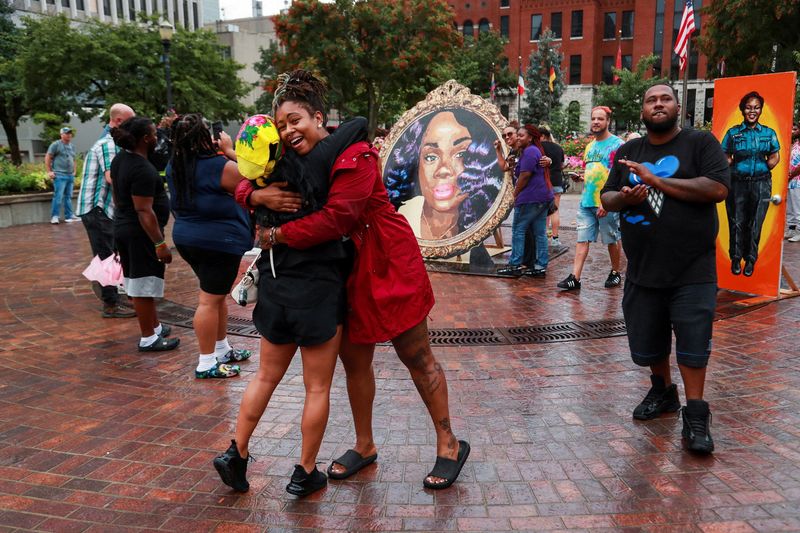Exclusive-Biden’s Justice Dept has yet to reach accords in police misconduct cases
2024.10.29 06:28
By Sarah N. Lynch and Andrew Goudsward
WASHINGTON (Reuters) – The U.S. Justice Department has opened 12 investigations into possible civil rights abuses by police departments since Democratic President Joe Biden took office, but has not secured even one binding settlement to implement reforms in any of them.
After winning office following a wave of mass protests in 2020 over police killings of Black people, the Biden administration highlighted “pattern or practice” investigations of alleged systematic civil rights violations by state or local police as critical to police reform.
Attorney General Merrick Garland got off to a swift start, in April 2021 launching investigations into the Minneapolis and Louisville police departments, which became the focus of widespread protests after white police officers killed George Floyd and Breonna Taylor.
If Republican Donald Trump wins the Nov. 5 election before the department reaches court-approved resolutions known as “consent decrees,” those probes and others could end without securing binding agreements to reform those departments.
“This administration has certainly invested a lot of resources into these cases,” said Puneet Cheema, a manager at the NAACP Legal Defense Fund. “But I think the metric of whether these cases are successful is determined by how they are implemented.”
A Reuters review of the probes shows that the Justice Department under Biden has moved at a slower pace than it maintained in Democratic President Barack Obama’s first term.
A Justice Department spokesperson said that ensuring lawful and effective policing is a “top priority,” noting that the department has been enforcing 16 existing agreements while also opening 12 new investigations.
The department “is steadfast in its commitment to ensuring the civil and constitutional rights of all Americans,” the spokesperson said.
During Obama’s first four years, the department opened 17 such investigations and reached negotiated settlements with four jurisdictions – Seattle; New Orleans; East Haven, Connecticut, and Portland, Oregon. During Obama’s second term, an additional eight investigations were opened and the department obtained 14 more agreements or court-ordered reforms.
Most involved a consent decree, a court-approved settlement that typically commits police departments to systemic reforms and often involves oversight by an independent monitor.
RODNEY KING
Congress authorized the Justice Department to conduct civil investigations into constitutional abuses by police, such as excessive use of force or racially-motivated policing, in 1994, as a response to the beating of Rodney King, a Black man, by white Los Angeles police officers.
Under Trump, the department largely stopped using consent decrees, and only opened one pattern or practice investigation into a police department.
Garland vowed to shake things up, telling lawmakers he was “shocked” when he saw videos showing the police killings of Black people in 2020.
“We have an opportunity to make dramatic changes and really bring forth equal justice under the law,” he told lawmakers at his confirmation hearing.
Of the 12 investigations launched during the Biden administration, the Justice Department has completed four – Minneapolis, Louisville, Phoenix and Lexington, Mississippi.
Minneapolis and Louisville have reached agreements in principle, a precursor to a consent decree, but no final agreements are in place.
“Where there is not a resolution in place, the Trump administration, if it takes power, could abandon these cases,” said Chiraag Bains, a former lawyer in the Justice Department’s Civil Rights Division and a current fellow at the Brookings Institution think tank.
ELUSIVE AGREEMENTS
Accords with the other police departments are more elusive. Months before the Justice Department released its findings into alleged abuses by the Phoenix police, the city told the department it opposed a consent decree, and that view has not changed.
In a statement, Phoenix Mayor Kate Gallego said the city was still in “early talks” with the Justice Department.
The mayor and city attorney for Lexington did not return multiple phone calls seeking comment.
In statements, Minneapolis and Louisville said they remain committed to reaching deals.
But an agreement in principle is not enough to ensure long-term compliance.
The Justice Department under Trump sought to withdraw from consent decrees that had been negotiated during the Obama administration, but not yet finalized, in both Chicago and Baltimore.
In the Baltimore case, a judge balked and allowed the agreement to proceed. In Chicago, the Illinois attorney general stepped in and obtained a consent decree, a move the Justice Department opposed in court.
The Biden administration did secure one consent decree, with the Springfield, Massachusetts Police Department in 2022, which resulted from an investigation conducted during the Trump administration.
Civil rights experts say there are many factors that affect the pace of such cases, from staffing challenges and the increased amount of digital evidence to review — such as body-worn camera footage — to the political environment.
The Civil Rights Division that conducts police investigations had to rebuild its staff after employees left during the Trump years.
The politics around such probes have also shifted.
The progressive “defund the police” movement that surfaced after Floyd’s murder faced a backlash following a spike in violent crime during the COVID-19 pandemic.
Christy Lopez, who worked in the Justice Department’s Civil Rights Division during the Obama administration, said she believes politics and differences in department leadership could be affecting the cases.
“This Justice Department does not have the same commitment to these cases,” she said, noting that former Attorneys General Eric Holder and Loretta Lynch urged staff to aggressively pursue and complete such investigations.
“This attorney general is much more sympathetic to the law enforcement perspective,” Lopez said.

A Justice Department official, granted anonymity to discuss internal agency details, said the department has provided additional staffing and resources to address the investigations.
The official also pointed to the parallel criminal cases the Justice Department has brought against police officers such as Derek Chauvin, who pleaded guilty to violating George Floyd’s rights and was sentenced to more than 20 years in prison following a separate murder conviction in state court.








